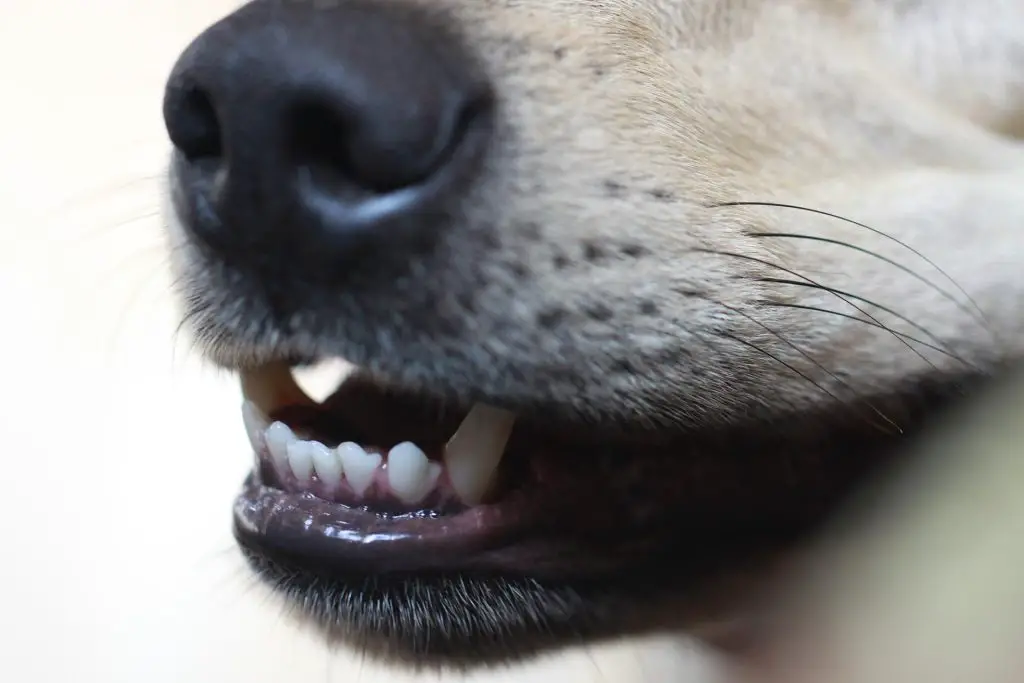If you have a 5-month-old puppy, you may be wondering why his or her breath smells so bad. Puppy breath is actually quite common, and there are several causes.
In this blog post, we will discuss the most common causes of bad breath in puppies and provide solutions to help get your pup’s mouth smell fresh again!
Key Takeaway
- Your 5-month-old puppy’s bad breath could be due to various reasons such as teething, poor oral hygiene, dietary factors, or potential health issues like gastrointestinal problems.
- To improve your puppy’s breath, ensure regular dental care, provide a balanced diet, give them chew toys that promote oral health, and schedule regular veterinary check-ups.
- You should ideally brush your puppy’s teeth daily to maintain good oral hygiene and prevent bad breath.
Why Does My 5-month-old Puppy Have Such Bad Breath?

Your 5-month-old puppy’s bad breath could be due to a variety of reasons, including teething, poor oral hygiene, diet, or health issues such as gastrointestinal problems.
Teething
At around five months old, puppies are usually in the process of losing their baby teeth and getting their adult teeth. This process can sometimes cause bad breath due to the blood and bacteria that can build up in the mouth during this period. Regular brushing with a pet-safe toothpaste can help alleviate this issue.
Poor Oral Hygiene
Just like humans, dogs can also suffer from poor oral hygiene. If your puppy’s teeth are not cleaned regularly, plaque and tartar can build up leading to bad breath. Regular dental check-ups with the vet and brushing your dog’s teeth at home can help maintain good oral health.
Diet
The type of food your puppy eats can also affect their breath. Some foods can cause bad breath more than others. If your puppy’s bad breath started after a change in diet, it might be worth considering changing back or trying a different type of food.
Health Issues
Although less common in puppies, bad breath can sometimes be a sign of underlying health issues. Gastrointestinal problems, kidney disease, or infections can cause bad breath.
If your puppy’s bad breath persists despite good oral hygiene practices and a balanced diet, it would be advisable to consult with a vet to rule out any possible health issues.
Do Puppies Get Bad Breath When Teething?

Yes. Puppies can get bad breath when they are teething. Their gums are swollen and they are drooling a lot. This can cause their breath to smell bad. You can help your puppy by giving them something to chew on, like a toy or a bone. You can also give them Puppy Toothpaste to help with their breath.
Have you ever wondered why puppies get bad breath when they’re teething? It’s actually quite simple: Their gums are inflamed and they’re drooling a lot.
This combination creates an environment that’s ripe for bacteria to grow. So, if you notice your puppy has bad breath, it’s probably because they’re teething!
Puppies start to lose their baby teeth (deciduous teeth) at around three months of age and by six months, most of them will have all of their adult teeth (permanent teeth). During this time, it is normal for puppies to chew on things more as they are exploring the world with their new mouths.
There are a few things you can do to help ease your puppy’s discomfort during this time. You can give them chew toys to help relieve the pressure on their gums. You can also try rubbing their gums with your finger to help soothe them.
The bad breath usually stops around the time the puppy starts to get its adult teeth, which is around six months old. In some cases, however, the bad breath may continue into adulthood says PetHelful.
Why Does My Puppy’s Breath Smell Like Fish?
There are a few possible explanations for why your puppy’s breath might smell like fish. One possibility is that they have been eating lots of fish-based food or treats. Another possibility is that they have an infection in their mouth or throat, which can cause bad breath.
If your puppy’s breath smells fishy and they are also showing other signs of illness, such as lethargy or vomiting, then you should take them to see a vet as soon as possible.
A common cause of bad breath in dogs is poor dental hygiene. If your puppy’s teeth are not brushed regularly, plaque and tartar can build up on their teeth and gums.
This can lead to gum disease, which can cause your puppy’s breath to smell like fish. Other causes of bad breath in dogs include kidney disease, liver disease, and diabetes. If your puppy has any of these conditions, they will need to see a veterinarian for treatment.
Kidney disease can cause a buildup of toxins in the body, which can lead to bad breath. The kidneys are responsible for filtering out toxins from the blood, so when they are not functioning properly, these toxins can build up and cause bad breath.
Liver disease can make your dog’s breath smell bad for a number of reasons. First, the liver is responsible for breaking down and metabolizing many different substances in the body, including toxins. When the liver is not functioning properly, these substances can build up in the blood and be released into the lungs, causing bad breath.
Additionally, when liver disease prevents the body from properly digesting food, this can also lead to bad breath. Finally, liver disease can cause an increase in blood sugar levels, which can lead to a condition called ketosis. Ketosis causes a fruity or acetone smell on the breath, which is often described as “sweet” or “sickly sweet.”
What Can You Do To Improve Your Puppy’s Breath
Improving your puppy’s breath can be achieved through regular dental care, a balanced diet, providing chew toys that promote oral health, and regular check-ups with your vet.
Regular Dental Care
One of the best ways to improve your puppy’s breath is through regular dental care. This includes brushing your puppy’s teeth daily or at least several times a week using dog-friendly toothpaste. This helps to remove food debris and reduce plaque build-up, which can lead to bad breath.
Balanced Diet
Feeding your puppy a balanced diet can also help improve their breath. High-quality dog food is designed to provide all the nutrients your puppy needs and is less likely to cause digestive problems that can lead to bad breath. Avoid giving your puppy human food, especially those with strong odors like garlic and onions, as they can contribute to bad breath.
Chew Toys
Chew toys are not just fun for your puppy, but they can also help improve their breath. Chewing helps to clean your puppy’s teeth naturally by removing food particles and preventing plaque build-up. Choose toys that are designed for dental hygiene, and are safe and appropriate for your puppy’s size and chewing habits.
Regular Vet Check-ups
Regular vet check-ups are essential for maintaining your puppy’s overall health, including their oral health. Your vet can spot any potential issues early, such as gum disease or tooth decay, which could be causing bad breath. They can also provide professional dental cleaning if necessary, and advise you on the best dental care practices for your puppy.
How Often Should You Brush Your Puppy’s Teeth
You should brush your puppy’s teeth regularly, ideally every day, to maintain good oral hygiene and prevent bad breath.
Brushing your puppy’s teeth daily is the best way to keep their mouth healthy. By starting early, you can help your puppy get accustomed to this routine.
Good oral hygiene plays a significant role in canine health.
Regular brushing helps to remove food debris, reduce plaque build-up, and prevent dental diseases that can lead to bad breath and other health issues.
FAQs
Q: Is bad breath in puppies a sign of a health problem?
A: Bad breath in puppies is not always a sign of a serious health problem. However, it can indicate various issues, such as dental disease, infections, gastrointestinal problems, or liver or kidney dysfunction. If you are concerned about your puppy’s breath, it is best to consult your veterinarian for a proper examination and diagnosis.
Q: Can poor dental hygiene cause bad breath in puppies?
A: Yes, poor dental hygiene can contribute to bad breath in puppies. If a puppy’s teeth are not regularly brushed, plaque and tartar can build up, leading to bacterial overgrowth in the mouth. This bacterial overgrowth produces foul-smelling gases, resulting in bad breath. Establishing a dental care routine for your puppy, including regular tooth brushing, is crucial to maintain their oral health and prevent bad breath.
Q: Are there any natural remedies for bad breath in puppies?
A: While natural remedies may help freshen your puppy’s breath to some extent, it is essential to address the underlying cause of the bad breath. Natural remedies like adding fresh parsley to their food, giving them coconut oil, or using breath sprays formulated for dogs can offer temporary relief. However, consulting with your veterinarian is recommended to identify and treat the root cause of the bad breath.
Q: Can changing my puppy’s diet help improve their breath?
A: Yes, changing your puppy’s diet can potentially improve their breath. Feeding a high-quality puppy food that meets their nutritional needs can help maintain good overall health, including oral health. Some commercial pet foods are also formulated to reduce plaque and tartar buildup, which can help alleviate bad breath. Consult with your veterinarian to determine the most suitable diet for your puppy.
Q: When should I be concerned about my puppy’s bad breath?
A: If your puppy’s bad breath persists despite efforts to improve it through proper dental care and a healthy diet, it is advisable to consult your veterinarian. Additionally, if the bad breath is accompanied by other symptoms such as excessive drooling, loss of appetite, vomiting, or diarrhea, it may indicate an underlying health issue that requires medical attention.
Q: Can I use human toothpaste to brush my puppy’s teeth?
A: No, you should never use human toothpaste to brush your puppy’s teeth. Human toothpaste contains ingredients that are not safe for dogs and can be toxic if swallowed. Instead, use toothpaste specifically formulated for dogs, which is usually flavored to be more appealing to them. Dog toothpaste is designed to be safe for ingestion and effectively cleans their teeth.
Conclusion and final thoughts
In conclusion, bad breath in puppies is a common issue that can have various underlying causes.
It is important to address this issue as soon as possible to prevent any potential health problems and maintain your puppy’s overall well-being.
Implementing good dental hygiene practices, providing appropriate nutrition, and seeking veterinary care if necessary are all important steps in managing your puppy’s bad breath.




